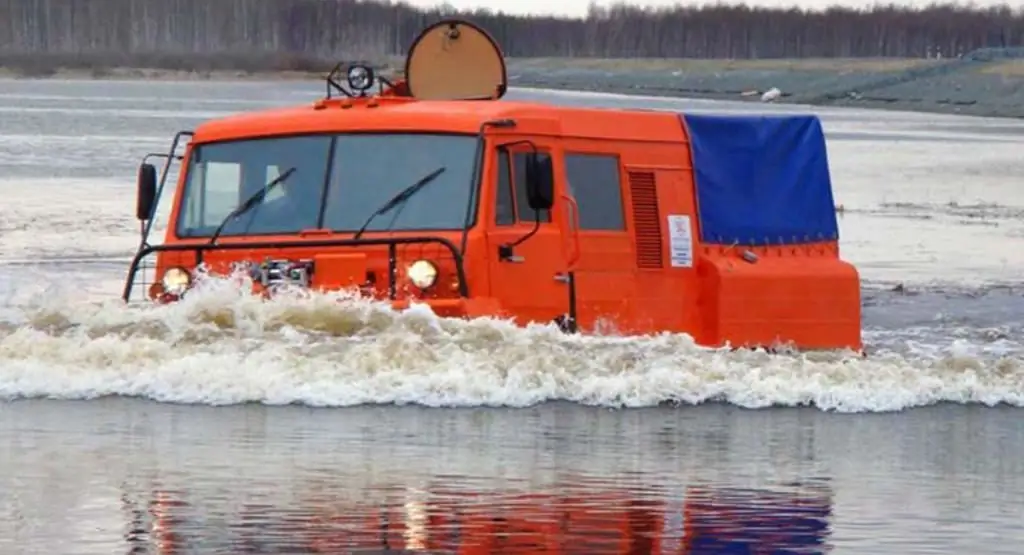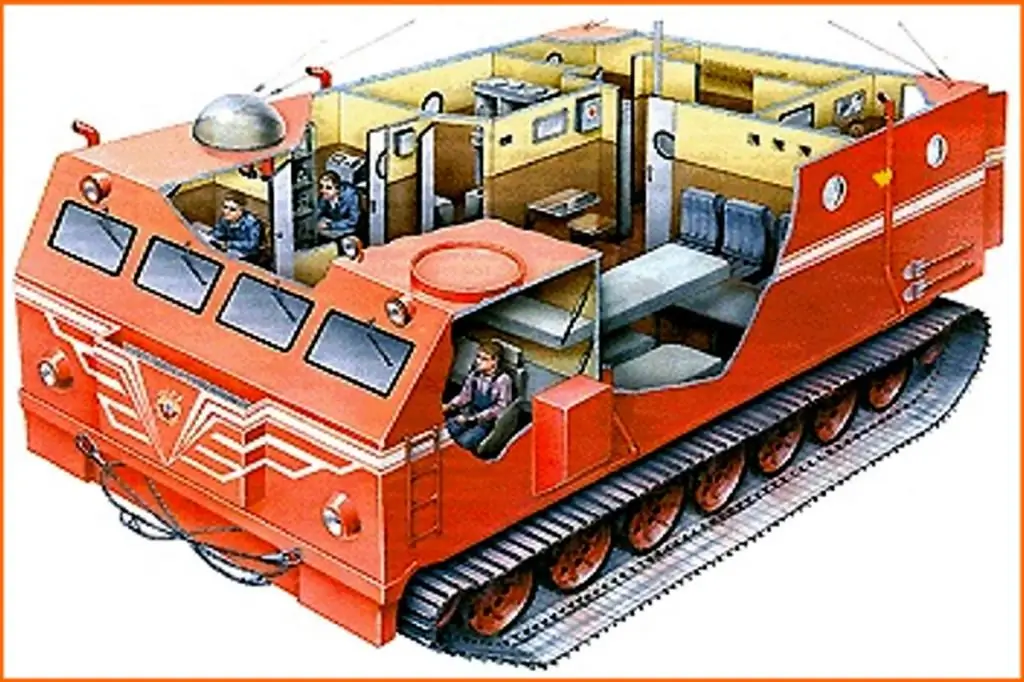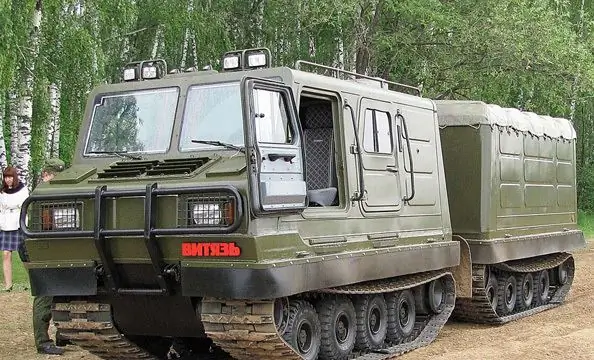2026 Author: Erin Ralphs | ralphs@carsalmanac.com. Last modified: 2025-01-22 21:14:13
BMD is an abbreviation for the phrase "airborne combat vehicle". Based on the name, BMD is a vehicle for moving a unit of airborne assault troops. Its main purpose is to fight enemy armored vehicles and enemy infantry. In professional military circles, this machine was called the "Booth".

To fulfill its combat mission, the BMD can be transported by military aircraft to the landing site. Landing can be carried out from Mi-26 aircraft and helicopters using an external sling.
How did the BMD-2 airborne combat vehicle appear?
The designers developed the first generation of BMD back in 1969, and after testing it was put into service with the Airborne Forces of the Soviet Union. Serial assembly of the combat vehicle was carried out at the Volgograd Tractor Plant. For the first few years, it was produced in a limited edition. To start mass production, the forces of the All-Russian Research Institute of Steel, the Institute of Welding named after. E. Patona.
In 1980, Soviet designers, having studied the experience of using BMD in real battles, moved on to improve the existing model. The need to modernize combatlanding vehicle became apparent after Afghanistan, where the armored vehicle was actively used. Having proven itself well in battle on the flat areas, the first generation airborne combat vehicle lost in the highlands.

The airborne combat vehicle BMD-2 entered service with the air forces of the Soviet Union in 1985. The second-generation machine did not differ much in appearance from the BMD-1. The comparative photo of the BMD-2 and BMD-1 shows that the changes affected the turret and armament. The hull and engine remained unchanged. The armored car passed its baptism of fire in combat operations in the Republic of Afghanistan.

In subsequent years, the BMD-2 was used in armed conflicts in Russia and abroad. Today, the "booth" is in service with the armies of Russia, Kazakhstan and Ukraine.
Design features of the BMD-2
The design of the amphibious assault vehicle is considered unique. In front of the center is the driver-mechanic, behind him is the commander on the right, and the shooter on the left. In the back there is a compartment for the landing. It can accommodate 5 paratroopers.
The body of the BMD-2 is conditionally divided into 4 compartments:
- department of management;
- combat unit;
- troop squad;
- engine-transmission compartment.
The combat unit and the control compartment are combined and are located in the front and middle parts of the armored vehicle. The rear half is divided into troop and engine compartments.
Armored Corpswelded from aluminum sheets that cover the BMD-2 crew. The characteristics of this metal allow you to achieve effective protection with a small weight. Armor capable of protecting the crew from bullets, small fragments of mines and shells. The thickness of the body skin in the front is 15 mm, on the sides - 10 mm. The turret has 7 mm thick armor. The bottom of the BMD is reinforced with stiffeners, which allows for successful airborne landing. The minimum landing height is 500 meters, the maximum height is 1500 meters. In this case, multi-dome parachutes with a reactive system PRSM 916 (925) are used.

After the modernization, the PM-2 received a new circular tower. It has a smaller size. In addition, she got the opportunity to fire at helicopters and low-flying aircraft. The vertical pointing angle has been increased to 75 degrees.
The body of the BMD-2 is sealed. This turned the "booth" into a floating armored vehicle. To move through a water barrier, a water jet installation is used, the operation of which is based on the principle of jet propulsion. Before starting to move through a water obstacle, it is necessary to raise the wave protection shield in front. Due to the properties of the amphibious vehicle, landing can be carried out from transport ships.
Engine and Chassis
When creating the BMD-2, engineers did not carry out a complete modernization of the engine and chassis. The amphibious assault vehicle is equipped with a 5D20 engine. This is a 6 cylinder diesel engine. It is capable of developing a power of 240 horses.
BMD-2 usescrawler. Each side has 5 track rollers and 4 rollers. The drive axle is rear, the steering wheels are in front. The chassis has a design that allows you to adjust the clearance. The minimum ground clearance is 10 cm and the maximum is 45 cm. The suspension is independent.
BMD 2. Characteristics of weapons
Modernization of the airborne combat vehicle in the 80s mainly touched the turret and armament. The military experience in Afghanistan forced us to revise the fire arsenal.
As the main firepower, a 2A42 30 mm automatic cannon is used. She is able to shoot on the move. The barrel is stabilized in two planes with the help of a weapon stabilizer 2E36-1 on electro-hydraulics. In the roof of the tower is the main sight VPK-1-42, pointing the gun. The "booth" is capable of firing at a distance of up to 4 kilometers.

Paired with a cannon in the turret is a 7.62 mm PKT machine gun. The combat set of the second generation PM is 300 rounds for the cannon and 2000 rounds for the machine gun.
Additional weapons for the BMD-2 can be used to increase firepower. The instruction manual defines the composition of additional weapons:
- one 9M113 "Competition";
- two ATGM 9M111 Fagot;
- 9P135M launcher.
Missile launchers are capable of aiming within 54 degrees horizontally and from -5 to +10 vertically.
Missile systems have been introduced into the armament to conduct a successful battle with air targets"Needle" and "Arrow-2".
Amphibious assault vehicle equipment
BMD-2 is equipped with a R-174 communication device, a R-123 radio station (later it was replaced by the R-123M).

In addition, on board the armored vehicle is:
- automatic fire extinguishing complex;
- system for filtering and extracting air;
- protection system against weapons of mass destruction and atomic weapons;
- chemical defense system;
- night vision devices;
- air ventilation system inside the body of the combat vehicle.
Technical characteristics "Booths"
During the battle, the "booth" is able to overcome various obstacles. Without difficulty, the BMD-2 airborne combat vehicle can drive onto a wall 80 centimeters high and overcome a trench 1.6 meters wide.
| Tactical and technical characteristics of the BMD-2 | |
| Weight | 8, 22 tons |
| Length with cannon | 5, 91 meters |
| Width | 2, 63 meters |
| Height, depends on ground clearance | from 1615 to 1965 millimeters |
| Fuel tank capacity | 300 liters |
| Range of operational action | 450-500 kilometers |
|
Max speed: track crossedarea water barrier |
80 km/h 40 km/h 10 km/h |
Modifications of BMD-2
The airborne troops use two modifications of the combat landing vehicle:
- BMD-2K - commander's version of the vehicle, additionally equipped with a R-173 radio station, an AB-0, 5-3-P / 30 gasoline electric power generator and a GPK-59 gyroscopic semi-compass;
- BMD-2M - in addition to standard weapons, it has a dual installation of Kornet ATGMs, in addition, a weapon control system is installed with the ability to aim at a target using a thermal imager.
Recommended:
All-terrain vehicle "Taiga": specifications, photos and reviews

All-terrain vehicle "Taiga": description, modifications, photos, features, maintenance and operation. Caterpillar all-terrain vehicles "Taiga": technical characteristics, purpose. Small-sized all-terrain vehicles "Taiga" 4x4: overview, parameters, reviews
All-terrain vehicle "Kharkovchanka": device, specifications, operating features and reviews with photos

All-terrain vehicle "Kharkivchanka": specifications, photos, operating features, pros and cons. Antarctic all-terrain vehicle "Kharkovchanka": device, layout, history of creation, maintenance, reviews. Modifications of the all-terrain vehicle "Kharkovchanka"
MTLB all-terrain vehicle: specifications, functions and photos

MTLB all-terrain vehicle: specifications, features, purpose, operating conditions, photo. MTLB all-terrain vehicle: description, driver work. parameters, functions, creation history. Work on a rotational basis as a driver of the MTLB all-terrain vehicle
GAZ-3409 "Beaver" snow and swamp vehicle: description, specifications and reviews

Many regions of Russia are not equipped with roads accessible for ordinary wheeled vehicles. The situation is often not corrected by various off-road vehicles. To deliver people and goods to such places, a special class of all-terrain vehicles with caterpillar propulsion has been created. It is to such machines that the GAZ-3409 "Beaver" belongs
"Pelec" (snow and swamp vehicle): specifications and reviews

"Pelets" is a snow and swamp vehicle, with which you can, without much effort, get into the most secluded corners of nature, completely surrender to your favorite business, without exhausting yourself on the road. After purchasing it, you will no longer need to carry heavy equipment in your hands, because all the equipment can be easily placed in the cargo hold. In addition, you no longer need to worry about taking a boat to rest, because "Pelets" can easily be transformed into it if necessary

